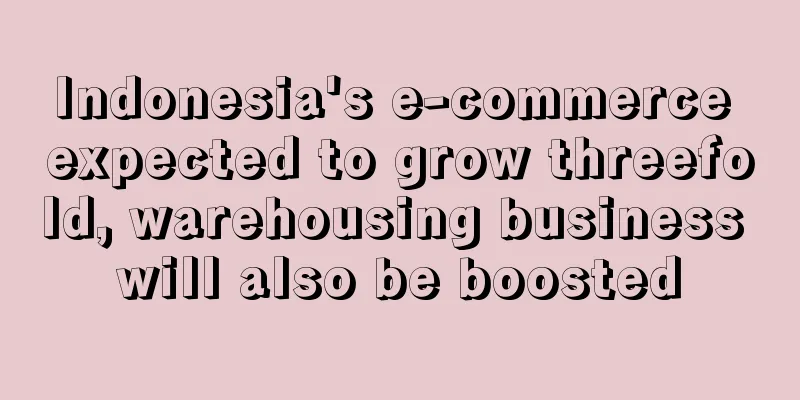Indonesia's e-commerce expected to grow threefold, warehousing business will also be boosted

|
Wherever there is e-commerce, there is logistics. Since the outbreak of the epidemic, logistics costs have been constantly changing. Therefore, logistics has also become a hot topic.
" The outlook for Indonesia's warehousing business is supported by at least three industrial sectors, " said Taufiq Nur, a researcher at the FEB Institute of Management at the University of Indonesia .
Taufiq noted that throughout 2020, e-commerce was the main driver of the digital economy, with an average annual growth of 54% compared to the previous year.
During the pandemic, various large e-commerce websites such as Tokopedia, Shopee, Bukalapak, Lazada showed a trend of increased traffic due to people’s travel restrictions. When e-commerce traffic increases, the warehouse capacity required for their products also increases.
Taufiq continued : “ In the next five years, e-commerce in Indonesia is expected to grow three times from its current level. ”
In addition, looking at the government's foreign direct investment (FDI) in the fourth quarter of 2020, the total investment in the transportation , warehousing and telecommunications industries exceeded US$1 billion.
“This means that both from the demand side, which is the growth of e-commerce, and from the supply side, these investors are very well positioned to support the warehousing business of the future,” Taufiq concluded.
According to Sanny, e-commerce grew at a faster pace in 2020, so digital trade contributed about 20% to the warehousing business.
“E-commerce has absorbed about 20% of the warehousing business, and the demand for warehouses will continue to grow in the next one to two years, ” Sunny said . “ This year , the warehousing business is expected to continue to grow at a rate of 20% to 30%. ”
Bima Laga, chairman of the Indonesian E-Commerce Association ( IdEA), said warehouses are one of the important infrastructures to support digital trade.
He is optimistic that as the digital economy and logistics business grow, the demand for warehousing land will also increase.
“ As the economy continues to grow, the logistics market will also grow due to the growth in e-commerce . Especially from the fast-moving consumer goods ( FMCG) and e-commerce sectors, which have been quite resilient during the pandemic situation. Most of the tenants of MLLP are from the FMCG, e-commerce and logistics businesses,” said Murjadi.
Indonesia E-commerce Warehousing logistics |
<<: India's Snapdeal launches new brand campaign, focusing on "high quality and low price" route
Recommend
Amazon Prime Day will increase the proportion of online retail sales in the United States, and Naver announced its withdrawal from eBay Korea bidding
Amazon Prime Day will increase the share of onlin...
Fashion products are becoming increasingly popular, here are the popular trends of Lazada Indonesia in 2021!
During the epidemic, people spent more time at ho...
What is Jindouyun ERP? Jindouyun ERP Review, Features
Jindouyun ERP is a service-driven professional so...
Sellers' profits are expected to increase 800 times! Medical devices are booming
The recent resurgence of the epidemic has caused ...
What is Social Email Extractor? Social Email Extractor Review, Features
Social Email Extractor is a powerful and innovati...
What is Shenzhen Luxshare Testing Technology Co., Ltd.? Shenzhen Luxshare Testing Technology Co., Ltd. Review, Features
Shenzhen Luxshare Testing Co., Ltd. was establishe...
What is It Flips? It Flips Review, Features
It Flips is a website that sells multi-functional...
What is BookTrakker? BookTrakker Review, Features
<span data-docs-delta="[[20,{"gallery"...
What is iOffer
iOffer is a negotiation-based transaction system ...
What is China Cross-border E-commerce Professional Committee? China Cross-border E-commerce Professional Committee Review, Features
The China Cross-border E-commerce Professional Com...
TikTok expands partnership with Shopify to test in-app purchases
TikTok and e-commerce platform Shopify said on Tu...
Sales volume exceeds 600 billion! The U.S. pet products market remains hot
Spending money on pets has become a long-term con...
Social media leads Canadian Generation Z’s shopping needs
For millennials, a brand’s social responsibility ...
What is Chiper Cash? Chiper Cash Review, Features
<span data-docs-delta="[[20,{"gallery"...
To reduce its carbon footprint, pet DTC brand Tailored launches environmental protection measures during Earth Month
According to PR Newswire, Tailored® Pet, a DTC pe...









